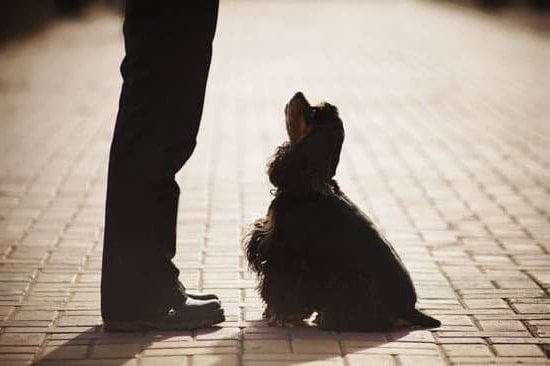Dogs bark for a variety of reasons, from boredom to excitement to fear. But barking at other dogs can be particularly annoying and can even lead to dangerous confrontations. Fortunately, there are ways to train your dog to stop barking at other dogs.
The first step is to determine why your dog is barking at other dogs. If your dog is barking out of excitement, you’ll need to work on getting them to calm down before approaching other dogs. If your dog is barking out of fear, you’ll need to help them overcome their fear and learn to associate other dogs with positive things.
Once you’ve determined the root of the problem, you can start working on a training plan. The best way to train your dog to stop barking at other dogs is through positive reinforcement. Start by rewarding your dog when they see or hear another dog and don’t bark. As they get better at this, you can start to decrease the number of rewards until they are only being rewarded when they are completely quiet around other dogs.
It may take some time, but with patience and perseverance, you can train your dog to not bark at other dogs.
How To Train A Dog To Stop Excessive Barking
There are a few things you can do to help train your dog to stop excessive barking. The first step is to determine why your dog is barking. There are many reasons why dogs might bark excessively, including excitement, fear, boredom, and aggression. Once you have determined the cause of your dog’s barking, you can begin to work on a solution.
If your dog is barking out of excitement or boredom, you will need to provide them with plenty of exercise and stimulation. Take your dog for walks or play with them in a fenced-in yard. You can also give them toys that dispense treats or play games with them that involve treats.
If your dog is barking out of fear or aggression, you will need to start by working on obedience training. Make sure your dog is responding consistently to basic commands like sit, stay, come, and down. Once your dog is obedience trained, you can begin to work on solving the problem behavior. If your dog is barking out of fear, you will need to start by teaching them to tolerate things that scare them. If your dog is barking out of aggression, you will need to work on teaching them to control their impulses.
It is important to be patient when training a dog to stop excessive barking. It may take time and patience to solve the problem, but it is worth it in the end.
How To Train Your Dog To Not Bark On Walks
-Choose a cue for your dog to stop barking. It can be a word like “enough” or a hand signal.
-Start by rewarding your dog every time he or she barks on a walk. This will help your dog to associate the cue with the behavior you want to stop.
-Once your dog is consistently responding to the cue, begin to only give the cue intermittently. Only reward your dog when he or she stops barking.
-If your dog starts to bark again, go back to rewarding him or her every time.
-Be patient and consistent with your training. It may take a while for your dog to learn to stop barking on walks.
Dog Barking Crate Training
Dogs bark for various reasons: boredom, excitement, fear, anxiety, and loneliness. The first step in stopping your dog from barking is to determine why he is barking. Once you have determined the reason, you can start working on a solution.
If your dog is barking out of boredom, you will need to provide him with plenty of exercise and stimulation. Taking him for walks, playing with him, and providing him with puzzle toys can help keep him occupied and happy.
If your dog is barking out of excitement, you will need to provide him with more structure. Make sure he knows when it is appropriate to bark and when it is not. Teaching him basic obedience commands can help him understand what is expected of him.
If your dog is barking out of fear or anxiety, you will need to work on building his confidence. Start with basic obedience commands and work up to more challenging exercises. Reward your dog for his successes and remain patient and calm during training.
If your dog is barking out of loneliness, you will need to provide him with plenty of companionship. Spend time with your dog each day and consider adding a second dog to your family. Dogs are social animals and need companionship to be happy.
If you are having difficulty stopping your dog from barking, it is best to consult with a professional trainer. A trainer can help you determine the root of the problem and develop a training plan that will work best for your dog.
How To Train A Dog From Barking At Other Dogs
There are a few things to keep in mind when trying to train a dog from barking at other dogs. The first step is to understand why the dog is barking in the first place. Is the dog territorial and barking at other dogs as a way to protect its territory, or is the dog just excited and barks at every dog it sees?
Once you have determined the reason for the barking, you can start to work on ways to correct the behavior. If the dog is barking out of excitement, you can start by teaching it to “speak” or “quiet” on cue. Once the dog is responding consistently, put him in situations where he might see other dogs, but don’t allow him to bark. If the dog starts to bark, cue him to “speak” or “quiet” and praise him when he complies.
If the dog is barking out of territoriality, you will need to start with basic obedience training. Once the dog is responding consistently to basic commands, such as sit, stay, come, and down, you can start to work on training him to “leave it.” This command tells the dog to stop whatever it is doing and go somewhere else. You will need to start by teaching the dog to “leave it” with treats, and then slowly increase the difficulty of the tasks, such as having the dog leave it when there are no treats available. Once the dog is responding consistently, put him in situations where he might see other dogs, but don’t allow him to bark. If the dog starts to bark, cue him to “leave it” and praise him when he complies.

Welcome to the blog! I am a professional dog trainer and have been working with dogs for many years. In this blog, I will be discussing various topics related to dog training, including tips, tricks, and advice. I hope you find this information helpful and informative. Thanks for reading!





